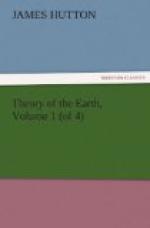But to proceed in pursuing a little farther our general or preparatory ideas. A solid body of land could not have answered the purpose of a habitable world; for, a soil is necessary to the growth of plants; and a soil is nothing but the materials collected from the destruction of the solid land. Therefore, the surface of this land, inhabited by man, and covered with plants and animals, is made by nature to decay, in dissolving from that hard and, compact state in which it is found below the soil; and this soil is necessarily washed away, by the continual circulation of the water, running from the summits of the mountains towards the general receptacle of that fluid. The heights of our land are thus levelled with the shores; our fertile plains are formed from the ruins of the mountains; and those travelling materials are still pursued by the moving water, and propelled along the inclined surface of the earth[1] These moveable materials, delivered into the sea, cannot, for a long continuance, rest upon the shore; for, by the agitation of the winds, the tides and currents, every moveable thing is carried farther and farther along the shelving bottom of the sea, towards the unfathomable regions of the ocean.
[Note 1: M. de Luc, in his second letter to me, published in the Monthly Review for 1790, says, “You ought to have proved that both gravel and sand are carried from our continents to the sea; which, on the contrary, I shall prove not to be the case.” He then endeavours to prove his assertion, by observing, that, in certain places where there is not either sufficient declivity in the surface, or force in the running water, gravel and sand are made to rest, and do not travel to the sea. This surely is a fact to which I most readily assent; but, on the other hand, I hope he will acknowledge, that, where there is sufficient declivity in the surface, or force in the running water, sand, gravel, and stones, are travelled upon the land, and are thus carried into the sea—at last. This is all that my theory requires, and this is what I believe will be admitted, without any farther proof on my part.]
If the vegetable soil is thus constantly removed from the surface of the land, and if its place is thus to be supplied from the dissolution of the solid earth, as here represented, we may perceive an end to this beautiful machine; an end, arising from no error in its constitution as a world, but from that destructibility of its land which is so necessary in the system of the globe, in the economy of life and vegetation.
The immense time necessarily required for this total destruction of the land, must not be opposed to that view of future events, which is indicated by the surest facts, and most approved principles. Time, which measures every thing in our idea, and is often deficient to our schemes, is to nature endless and as nothing; it cannot limit that by which alone it had existence; and, as the natural course of time, which to us seems




